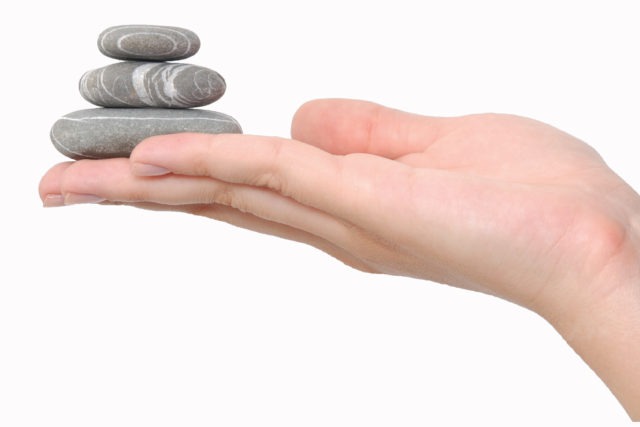The movie Murder by Death, a spoof with some of fiction’s most famous detectives, opens with a strange scene. Alec Guinness, a favorite of mine, plays an old, blind butler who comes in with a sheaf of envelopes to which he must affix stamps. He puts the envelopes to one side, and the camera, with surrealistic flair, shows only a wide-open mouth with the tongue sticking out. Up comes the hand with the stamps one by one and one by one the tongue licks the stamps and the hand returns to stick them to the envelopes. We hear the fist pounding lightly to make sure each stamp is secure. Then, after the entire sheaf has been gone through, the camera backs up and we see all the stamps – carefully affixed to the desk.
All of us are capable of this if we do not pay attention to little things. Don’t you have a saying that if we take care of the little things, the big things will take care of themselves? It may sound trite, yet even people with the best of intentions and the soundest of plans often fail because they overlook details that turn out to matter. If you want to see someone who will succeed, watch for the rare man or woman who takes pains over each small step.
G. K. Chesterton has a book called Tremendous Trifles. I find that a very apt phrase. There are a large number of tremendous trifles in life. We think they are trifles until we look back and add them up; then we discover that taken as a whole, their effect has been tremendous. It is the same with spiritual growth. Most of us who are serious about training the mind try to be vigilant on major occasions; it is on little occasions that we forget. Yet it is on these thousands of little occasions that the mind is taught to be calm and kind: not instantaneously or by great leaps, but in the ordinary choices of the day.
The Buddha, the most practical of teachers, defined the wise man or woman in a thoroughly practical way: “One who will gladly give up a smaller pleasure to gain a greater joy.” That is discrimination, the precious capacity to see life clearly and choose wisely. When it is understood, every choice becomes an opportunity for training the mind.
When I first started meditating many, many years ago, in the midst of an active academic life, I had difficulty finding time for it. Most of my activities were harmless enough, but they were numerous and consumed a good deal of time and energy. I read a lot of books in those days, and much of what I read I don’t think was useful even for the literature classes I was teaching. I read those books because I enjoyed them and because I had been trained to believe that literature is for enjoyment. That was the appeal made by many important figures: literature for its own sake, art for its own sake.
As my meditation deepened, however, these attitudes began to change. Nothing, I realized, is for its own sake; everything is for life’s sake. This one insight simplified my priorities enormously. Immediately I began to prune my activities, lining out things that made no real difference to anybody, including myself. Today, everything I do from morning meditation on – eating breakfast, going for a walk, writing, reading, even recreation – is governed by one purpose only: how to give the very best account of my life that I can in the service of all.
That is what I mean by developing discrimination. At first it was difficult to make myself put my books aside an hour earlier to make time for evening meditation. Often my mind would protest, “Can’t we read just a little more?” Yet the joy that fills my life today cannot even be measured on the same scale as the pleasures I once held dear. Once we get even a taste of what meditation can do, we start looking for ways to make time for it no matter what comes in the way.
But there are smaller pleasures to be given up. I am not denying that on a cold morning, for instance, it is more pleasant to stay under the blankets than to get up early for meditation. The Buddha does not say to give up a small pain in favor of a greater joy; he says, “Give up a small pleasure.” That is the touch that makes him such a good teacher. Pulling the blankets over your head and lying there for ten minutes more is pleasant, but as pleasures go it doesn’t rate more than half a cent. Perhaps if you could stay under the covers forever . . . Yet even sleep loses its attraction in time; that is the nature of life. So when you are tempted to stay in bed at the expense of meditation, remember these words: “Give up a small pleasure for a lasting joy.” Meditation will enhance everything in your life. It will follow you to work and make you calmer, more energetic, more creative, and more secure.
This apparently trifling difficulty of getting out of bed in the morning hides a tremendous truth. For most of us, it is a problem built up through little acts of omission. The alarm goes off and we sigh, “Oh, just five minutes more. It’s six o’clock; I’ll still be there for meditation at five minutes after.” That is how it begins. When you go on saying “five minutes after” every day for three hundred and sixty-five days, you develop what yoga psychology would call a five-minutes-after samskara – that is, a conditioned response that is not confined just to getting up. Everywhere you go it will be your habit to be late and to postpone.
One powerful way to deal with this samskara – in fact, with any samskara – is to do just the opposite of what it demands. This is one of the surest ways to change a bad habit. The Buddha says, “Oppose a negative wave of thought with a positive wave of thought.” It is such a simple, practical, effective strategy! The problem, of course, is that it is seldom very attractive.
Sometimes, walking at the beach when the tide is coming in, I will be striding along when a wave sweeps up, making me leap like a kangaroo to escape getting soaked. But when the tide and the contours of the shoreline are right, as the water is drawn back into the ocean it surges up in a backlash and crashes head-on into the next wave. There is a big explosion, and the oncoming wave is stopped cold.
Similarly, if a negative wave whispers to you one morning, “Just five minutes more . . . let’s make it five after six,” send a contrary wave back. Leap out of bed, and the next morning get up at five to six. Tell your mind, “If you like, you can even suggest six-thirty. I will get up at five-thirty and have my meditation.” After a few mornings of this, I can assure you that your mind will have nothing more to say on the subject. This is the kind of language it understands. It is because we offer no resistance that the mind gradually begins to say “Fifteen after six” and finally, “Why not seven? It’s a good, round number.”
“Be reasonable,” your mind may object. “Does a five-minutes-late habit do anybody any real harm?” First – and I want to emphasize this – the main issue is not the five minutes; it is training the mind. But it is important to understand that the mind’s habits are not merely its own affair. Generally they affect other people in unsuspected ways as we move through the day.
I am a confirmed theater-goer, for example; I enjoy good plays and good acting. And I like to get to my seat early, mostly out of courtesy, but partly because I enjoy the human drama as the audience trickles in. On one memorable occasion the curtain went up and we were well into the opening scene when a couple stumbled in and started looking for their seats, still absorbed in a heated discussion that must have begun out on the street. The gist of it was: where was the car? They had arrived at the last moment and rushed off without noticing where they had parked, and they kept on trying to settle the matter while stepping apologetically on half a row of toes. “Was it Franklin or Polk?” “Really, dear, I think it must have been Pine.” Most of us thought this was far more dramatic than the play. I was on the verge of saying, “Please go right up on the stage. If you can sing and dance too, that is all we could want.”
The same sort of scene takes place at classes, meetings, everywhere. A simple remedy is to make it a habit to go places early: we avoid making people wait for us, and we avoid interrupting them once they have started. In details like these, consideration for others becomes natural to a well-trained mind.
Once you are out of bed and sitting for meditation, the mind will probably try to distract you. That is the next “tremendous trifle”: tremendous because what is at issue is not whether the subject of the distraction is big or small, good or bad, but the native distractibility of the mind.
Many people, for example, sooner or later encounter a sleeping problem in their meditation. After all, it is only natural to feel sleepy when the neuromuscular system begins to relax. And if you do doze off for a minute or two, what does it matter?
This is one subject on which I give hard-boiled advice: the moment you begin to feel sleepy, draw yourself up straight and resist. A problem with sleeping in meditation does not come one fine morning in July and ask, “May I join you?” It has been inching in, little by little. That is why vigilance is required right from the outset. Our impulse is to let the chin drop a little, let the spine sag, allow the words of the meditation passage to get blurry around the edges. Fight that impulse by doing just the opposite. The moment you begin to feel drowsy, draw away from your back support, sit up straight, and concentrate with all your might. When this kind of resistance becomes your natural response, you can overcome the problem of sleep even if it has been going on for months.
The mind has many, many cards like this up its sleeve. Most of us have a lot of things to attend to in the morning – some of which, it is true, we could have taken care of the night before – and of course we don’t want to forget to do something vital because we have run out of time and have to rush to work. “Therefore,” the mind will tell us with its own peculiar brand of logic, “why not cut meditation five minutes short and get started? What difference can five minutes make?” That is one thing you should never do. Here again, when the mind advises cutting out five minutes, smile benignly and add five minutes more.
This strategy of doing the opposite of what a conditioned impulse demands works beautifully with an eating problem. Everyone feels tempted when confronted with something tasty. Even if we are not really in need of sustenance, we often go ahead and have a little extra. It is only human, you know. “Just one little piece,” the mind coaxes, “three inches by two.” There again, the answer is to make it minus three-by-two: take a smaller piece than you would have taken. The mind can really get offended by this kind of treatment, especially after many years of having its own way. But I assure you, if you stand firm on such issues the mind will come to have such respect for you that it will think several times before trying a trick like that again.
With this strategy, we are learning a most valuable skill: we are gaining the will and the detachment not to act on impulse. Where this really pays off is in personal relationships, where acting on impulse spreads from individual to individual in countless little chain reactions throughout each day. Susan receives a letter from her mother-in-law announcing a two-week visit and she gets agitated; she cannot help it. Then she comes and says something curt to us, and we take it personally and put her on our blacklist for months. Most quarrels start with just this type of misunderstanding. It is so pointless.
When someone is unkind to us, we need not take it personally. Why should we? We are not getting hurt; if anyone is hurt, it is the other person. In India we put it picturesquely: when you are unkind to your neighbor, the cosmic auditor enters a debit for unkindness against you.
The rule to remember here is never to react immediately. That is the purpose of training the mind in all these other tremendous trifles. Whenever a negative emotion calls, put it on hold. Do not listen to its arguments. If you wait until all the evidence is in, there usually turns out to be no need to accept its charges, which can be heavy.
I know how hard it can be to put this rule into practice. Luckily, understanding it alone can help a great deal. Back in the days when I taught on a university campus, whenever people were curt to me I would get agitated, just as everybody does. Sometimes their sharp words could be defended; often they seemed unfair. But even when I could see their point of view I used to get agitated. Then I would recall that it is always the unkind person who pays inside, and I would begin to feel sorry for them. A little compassion would come in, and once compassion comes in, the desire to retaliate goes.
Sometimes, of course, it is necessary to make our differences of opinion clear. But even then it is rarely the differences themselves that make for unpleasantness; it is the arrogance with which these differences are often aired. “I am right. How can you possibly be right?” This is an almost universal attitude. A more appropriate approach, of course, is to concede, “There is something in what you say, and there is something in what I say. Why don’t we try to find this common something?” But to do this, the mind has to be taught not to go off on impulse. Reacting on impulse is just being a jukebox: someone puts in a quarter and out comes whatever outrageous song the mind wants to sing at the time.
Who wants to be dictated to by a jukebox mind? And who would let a jukebox upset him? That is a question we can always ask ourselves when adrenaline is beginning to flow. Here, a sense of humor and a sense of humility are of great help. Most people get offended easily because they have an inflated sense of dignity. But after all, if somebody does make a remark at our expense, how is our dignity affected? It is not against us that the debit entry is made. Simply by maintaining a sense of humor and humility, we can teach the mind not to get upset even when a real trial comes.
In small matters like these, gradually the mind can be effectively trained. At home, in meditation, at work, in moments of relaxation with family and friends, we can go against the conditioned caprices of the mind and gain, little by little, control of something which often seems nebulous and elusive: our own destiny.



















